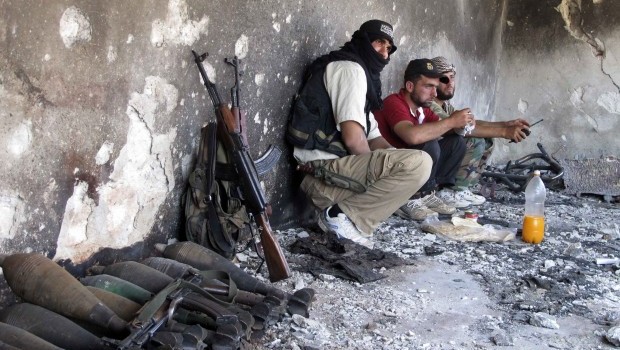In the first two weeks of Ramadan, 1,262 Syrians were killed. The news did not make headlines and people were not agitated. This makes us wonder if what’s happening in Cairo has killed the Syrian revolution or if the latter is fading into the background, similar to what happened in Iraq, with explosions killing hundreds every day becoming normal.
There is no doubt that the Syrian revolution is being ignored—not because people care less, but because of recent events in Egypt. Around a hundred people were killed in Egypt during the first two weeks of Ramadan. There are fears that Egypt is on a path that might not end for months, despite attempts at political reconciliation and calls for early legitimate elections. This negative development will place Syria in the shadows, diverting the concern of its neighbors, and will grant Bashar Al-Assad and his allies—the Russians, Iranians and Hezbollah—the opportunity to commit more genocidal crimes in the shadows, perhaps even crimes worse than what has been witnessed in the past two years.
We should not compare the causes of the Syrian rebels and the Egyptian people, or label one more important than the other. We should also avoid measuring the importance of each according to the number of casualties, because blood and chaos are outcomes of deep rifts that have existed for decades and not just a few months or years.
Syria is not Egypt. Assad’s regime exploited the world’s attention on the bloody events in Egypt to draw a false comparison, claiming that terrorists in Syria are like terrorists in Egypt, and that the legitimacy of the Syrian regime is equal to that of the Egyptian one.
The truth is there is a huge difference between the two. No one can deny that some Egyptians believe the current Egyptian opposition—the Muslim Brotherhood—have both a cause and popular support. Those who reject the Brotherhood also have a different cause and different supporters. Egypt is facing a political struggle, while Syria faces a struggle against a despised criminal regime that has deliberately committed murders on a daily basis and on an unprecedented scale.
But Assad, along with his propaganda, can exploit the situation in Egypt for his own benefit, and claim to be a partner of the Egyptian regime in the course of its ordeal. He did this before, when he claimed that both his and Egypt’s regimes are being targeted by foreign conspiracies. This propaganda is losing its value as the Egyptian government distances itself from Assad’s regime, and it is expected that Egypt will play a significant role in confronting the regime in Damascus.
Egypt will stand up to Damascus. While he was in power, Mohamed Mursi and his cabinet avoided the Syrian issue on purpose. It was only addressed on a few occasions, during visits to Tehran and Moscow where Mursi adopted a public stance in support of the Assad regime. Later on, however, during a conference of religious groups held during the last month of his presidency, he decided to cut ties with Damascus. The interim government that replaced Mursi did the same. It also took specific measures against Syrian refugees in fear of hostile groups sneaking into the country amid political turmoil in Egypt. It then adopted a stance in support of the Syrian revolution by accepting the new chief of the Syrian Coalition, Ahmad Al-Garba, and announcing its solidarity with the coalition.
Egypt will play an important role in the Syrian revolution, especially since the Egyptian army considers its role a regional one. The institution of the military is an important pillar in regional relations, beyond being the force that defends the country. It must not be forgotten that Egypt has played the role of military and political counterweight to Iran and Assad’s regime for the past thirty years. If it becomes too preoccupied with its domestic battle to strengthen the system and protect its security, naturally it will not be able to get involved in the struggle against Iran and the Assad regime. This struggle, however, may later on require a regional military confrontation.

Trackbacks/Pingbacks